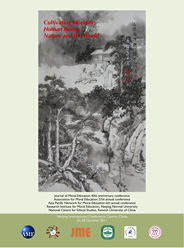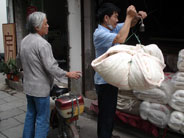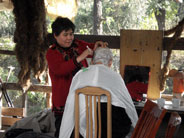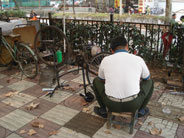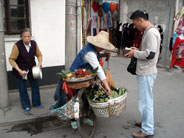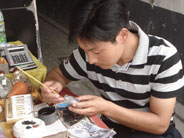The pre-conference workshops will take place in the Nanjing International Conference Hotel on the morning of Monday, 24 October. They offer an interactive environment to learn about assessment tools, review the state of play in the field of moral education and development, enhance teaching and learning, investigate new strategies for professional development and develop new curricular strategies, especially in the domain of the conference theme.
Conference participants wishing to attend a pre-conference workshop will need to register for it at the time of their general registration for the conference and pay the appropriate fee in US$. Workshops have minimum and maximum numbers of participants who can be accommodated. If the workshop you wish to register for does not obtain sufficient registrants, or too many, you will be contacted by email and asked to transfer to another workshop or have your registration fee for the workshop refunded in Chinese yuan (RMB) at the conference registration desk in the NICC. Most workshops include a 30 min. break. If you have additional questions about the workshops or any special needs related to attending one, please contact Jason Stephens.
Workshop 1: Towards A Glocal* Environmental Ethics
[ *‘Glocal' refers to a space where the global intersects with the local]
Kindly note that this Workshop is no longer available.
Monday, 24 October, 8.30-12.00
This workshop invites participants to examine the Confucian conception of the unity of humans and nature, Aldo Leopold's Land Ethics, deep ecology, and ecofeminism. Participants will undertake a collective inquiry into how the pursuit of global economic justice must attend to the complicated interplay of global and local environmental concerns. Informed by the confluence of bioregion or place-based education and global education, participants will explore how to integrate global education and bioregion-based education in order to recognise that individual and collective agency can be the key to raising our awareness of global interconnections and re-balancing modern culture with the biosphere. Overall, this workshop will facilitate participants' developing analysis of the conceptual roots of ecological problems that is beyond critiquing western cultural hegemony. Participants will also develop a non-dualistic framework for probing into the global/local assemblage and into anthropocentric vs. non-anthropocentric ethical reasoning.
Organiser: Dr Huey-li LI, Professor of Educational Philosophy, University of Akron, Ohio, USA. For more information about Dr. LI, please click here.
Workshop 2: Stimulating Moral Judgment Competence with the Konstanz Method of Dilemma-Discussion –a Taster Workshop
Monday, 24 October, 8.30-12.00
This workshop introduces the Konstanz Method of Dilemma-Discussion (KMDD) through practical demonstration and theoretical explication. The KMDD, which grew out of the Blatt-Kohlberg-Method, has been optimised over the past two decades on the basis of the dual aspect theory of moral behaviour of Socrates and Piaget, of new research findings, and of continuous self-evaluation of the learning-efficacy of the method. Its relative effect size is far above r > 0.40, and the absolute effect size of a single session is 5 C-points (on the 100-point moral competence scale), which is about as much as the effect of a whole year of good general education. However, such efficacy is achieved only by thoroughly trained, certified KMDD-teachers. Their training encompasses a 40 hour workshop-seminar, 80 hours of training-on-the-job, and a rigorous examination of their teaching proficiency through an uncut video-demonstration. The first three hour-unit of this training will be presented in this taster workshop. (See: http://www.uni-konstanz.de/ag-moral/)
Suggested preparatory reading:
Lind, G. (2008) Teaching students to speak up and to listen to others: cultivating moral democratic competencies, in: D. E. Lund & P.R. Carr (Eds) Doing democracy and social justice in education: political literacy for all students (New York, Peter Lang Publishing), 319-335.
Lind, G., Hartmann, H. A. & Wakenhut, R. (Eds) (2010) (2nd edn.) Moral judgment and social education: studies in the psychology and philosophy of moral judgment and education (Edison, NJ, Transaction Publisher) (Preface by L. Kohlberg).
Organiser: Prof. Dr. Georg LIND, Department of Psychology, University of Konstanz, Germany. For more information about Dr. LIND, please click here.
Workshop 3: An Overview of the Sciences of Morality
Monday, 24 October, 8.30-12.00
The purpose of this workshop is to provide an overview of current debates in the field, especially for conference participants who would like a pre-conference road map of some discussions that will occur at the conference. Participants will be introduced to the struggles within and between three groups of researchers: (1) researchers who assume that personal moral knowledge and competence are possible and ask, How do individuals develop them?; (2) Researchers who assume that ‘morality' is primarily a social phenomenon performing social functions and ask, What processes perform those functions, and what subvert them?; And (3) researchers who assume that our species evolved from predecessor species not capable of morality and ask, What are the essential capacities, and how did they evolve? An outline of how answers to these three questions can be reconciled will be presented and opened up for discussion during the third hour of the workshop.
Organiser: Dr Don Collins REED, Professor of Philosophy, Wittenberg University, USA. For more information about Dr. REED, please click here.
Workshop 4: Cosmic Modesty: Chikuro Hiroike's Approach to Morality, Nature and the World in Moralogy
Kindly note that this Workshop is no longer available.
Monday, 24 October, 8.30-11.30
Moralogy is a unique system of moral science first sketched out about eighty years ago by a Japanese scholar, Chikuro Hiroike. He published his Treatise on moral science: a first attempt to establish Moralogy as a new science, which runs to over 3,000 pages in Japanese,in 1928. An English translation, entitled Towards supreme morality: an attempt to establish the new science of Moralogy, appeared in 2005 and was reviewed in JME in 2008 (37:4). Lawrence Kohlberg had great academic as well as personal sympathy for Hiroike. The workshop will provide an outline of Moralogy and an assessment of its relevance to moral education and to a variety of contemporary global problems. Participants can be provided with an outline of the Treatise at three different levels of detail, running to nearly 40 pages, prior to the start of the workshop on request from the organiser.
*NOTE: Dr. Iwasa is willing to subsidise up to half of the registration fee. Please contact him directly
Organiser: Dr Nobumichi IWASA, Professor, Reitaku University and visiting Professor, The Institute of Moralogy Research Centre, Japan. For more information about Dr. IWASA, please click here.
Workshop 5: Applying the Model of Hierarchical Complexity to Scoring Moral Narratives and Constructing Instruments to Measure Moral Development
Monday, 24 October, 8.00-12.00
The Model of Hierarchical Complexity provides a framework for scoring reasoning stages of adults in any domain as well as in any cultural setting. This workshop teaches people to understand and apply the Hierarchical Complexity Scoring System. Participants will learn about: 1) the model; 2) the concepts underlying the model; 3) the description of the stages and their relationship to Kegan's and Kohlberg's stages; and 4) examples of scoring samples from interviews, illustrating moral development 5) creating instruments consisting of vignettes, representing stages from order 7 to 12 (primary, concrete, abstract, formal, systematic, and metasystematic). Also examined are how we resolve difficulties in discerning these stages, and transitions and how they can be scored with reliability and validly. Finally, we present Rasch analysis, which is a method of changing ratings of items into Rasch Scaled Scores both for the items and for the participants.
*NOTE: Participants must bring their own laptop computers
Organiser: Dr Michael Lamport COMMONS, Department of Psychiatry, Beth Israel Deaconess Medical Center, Harvard Medical School, Cambridge, USA. For more information about Dr. COMMONS, please click here.
Workshop 6: Drama Pedagogy as a Catalyst to Enhance Emotional, Social and Moral Learning
Kindly note that this Workshop is no longer available.
Monday, 24 October, 8.30-11.30
Drama pedagogy is able to act as a catalyst to enhance a learner's emotional, social and moral learning. In drama pedagogy drama is employed as a pedagogical tool to promote learning rather than to produce an artistic production. This workshop demonstrates how drama pedagogy can create meaningful entry to emotional engagement and provide contexts for moral encounters. A picture story is used as a starting point. With the roles assigned to them, participants ‘live through' characters who are forced not to empathise with the protagonist –a process which aims to raise their moral awareness. As the story develops, participants are asked to elaborate reasons behind their behaviour and decisions. With a dramatic turn, they are invited to reflect on the decisions made and to assess the impact of their social action in relation to others and to the world. At the end of workshop, questions will be answered and possible challenges and potential of applying drama pedagogy will be discussed.
Organisers: Dr Shiao-Yuh CHOU, Lecturer, Singapore Centre for Chinese Language; Tai Cheen NG, Principal Master Teacher, Curriculum Planning and Development Division, Ministry of Education and Lecturer, Singapore Centre for Chinese Language; Cheong Yun YEE, Singapore Centre for Chinese Language, Nanyang Technological University, Singapore. For more information about the organisers, please click here.


